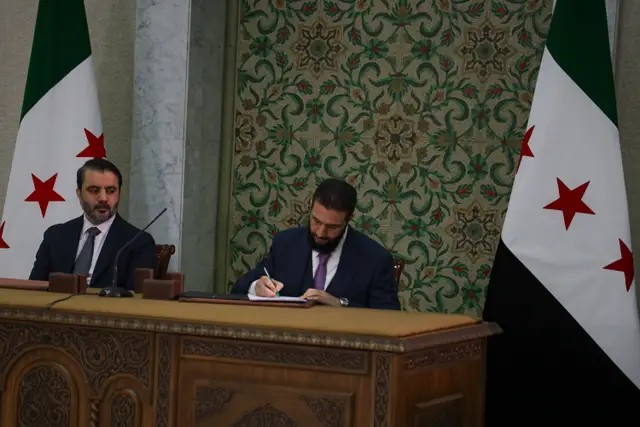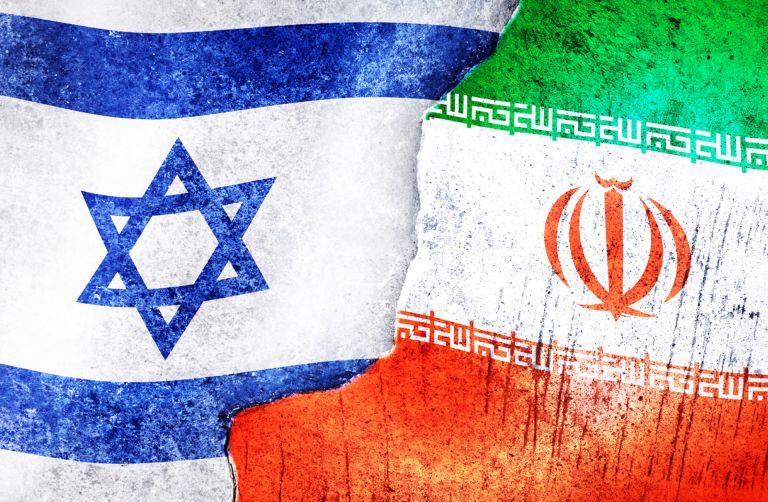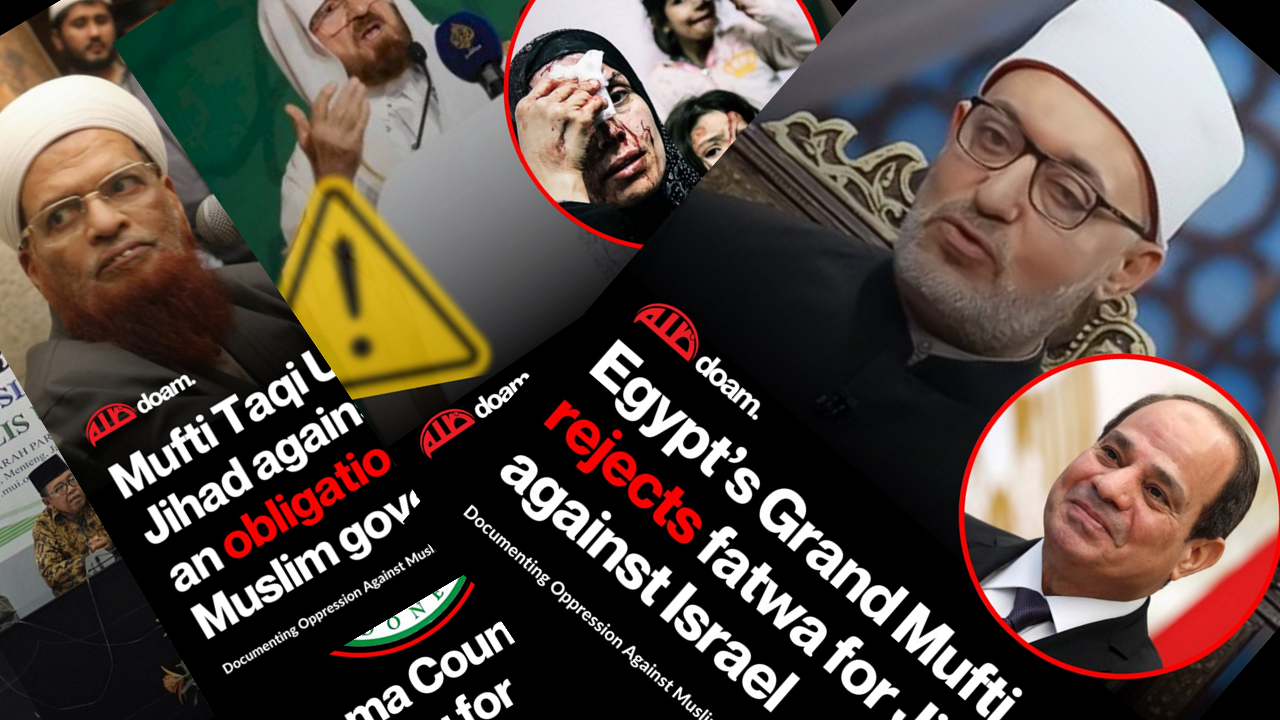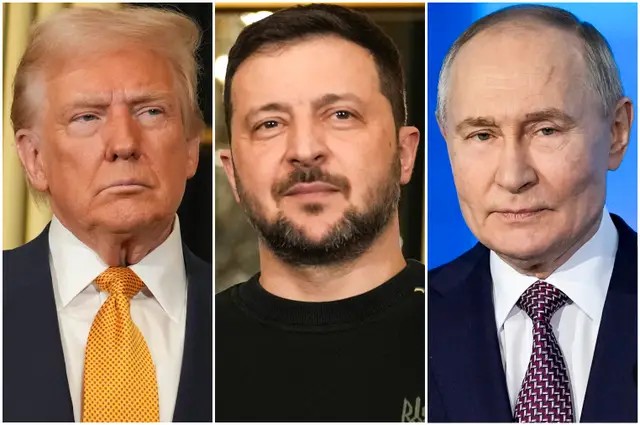On March 13th, Syrian President Ahmed al Sharaa signed the first draft of the new constitution, but what does it say?
What is a constitution
A constitution is the most important set of laws in a country that are usually made when the country is founded and are very difficult to change. If a regular law is passed that goes against a constitutional one, the constitution or the regular law must be changed. These laws usually say how the government works and how the country should be run, such as the powers and limits of the government.
Summary of the new Syrian constitution
Chapiter one: General Provisions
- Keeps the name “Syrian Arab Republic”, which has been in use since 1961
- Maintains the claims held on the Israeli occupied Golan Height in the south [and potentially Hatay though unlikely due to Türkiye’s close relations with the new regime], and that Syria is an independent nation
- The government will guarantee the freedom of its citizens
- The President of the country will be Muslim
- The laws of the country shall be based on Islamic principles
- Religious freedoms and expression that does not disturb public order shall be safeguarded
- Arabic is the official language
- Damascus is the capital
- The flag:
- Length to Width 3:2
- Three horizontal stripes of equal size, green, white and black
- Three equally sized black stars in the middle, white, stripe
- The government will maintain cultural diversity whilst also maintaining the unity of the country
- The government will fight against corruption
- The government will coordinate reconstruction efforts and the returning of refugees with other countries and organisations
- The government will combat violence and extremism whilst respecting freedoms
- No paramilitary organisations (non-government military) will be permitted
w
Chapter two: Rights and Freedoms
- All citizens have legal equality regardless of race, religion or gender
- The government will ensure a free economy, but prevent monopolies and ensure improvement of citizens living standards
- The government guarantees the human rights and freedoms of its citizens
- The government guarantees free speech and press
- No citizen will be exiled or prevented from returning
- The government guarantees freedom of association with organisations, including trade unions and other organisations
- Work is a right of every citizen and the government will ensure equality of opportunities
- Every citizen is entitled to litigation, legal defence, and appeals
- Every law can be reviewed by the court (judicial review as mentioned in “What is a constitution“)
- Forced disappearance and torture are illegal
- No person can be held without trial
- The government will protect children from exploitation, abuse, and mistreatment
- The government will protect women, their rights and their dignity
- The government shall promote the family as the foundation of society
- These rights are all guaranteed by the government, but may be restricted after due legal process to protect public order, morals, and the rights of others
Chapter Three: The Transitional Government
- The law-making branch of government (legislative) shall be the People’s Assembly:
- Two thirds shall be elected
- The President shall appoint a third of the Assembly to ensure competence and fair representation
- Dismissing a member from the Assembly requires two thirds of the Assembly to agree
- Members of the Assembly shall enjoy parliamentary immunity
- The Assembly shall stay until a permeant constitution and legislative body is established
- The Assembly shall be reselected every 30 months
- Members of the Assembly must take the oath; “I swear by Almighty God to perform my duties with honesty and sincerity.”
- The first action of the Assembly shall be choosing its speaker, two deputies and a secretary in an anonymous vote. Before the speaker is chosen, the oldest member shall oversee the Assembly
- The Assembly shall draft its own internal regulations within a month of the above vote
- The functions of the Assembly are as follows, each shall be done with a regular majority vote:
- Pass laws
- Change or get rid of current laws
- Ratify (vote for or against) treaties with other countries
- Approve the government budget
- Grant pardons
- Accept or reject members resignations
- Remove its members parliamentary immunity
- Conduct ministerial hearings
- Changing the constitution, requiting a two thirds majority
- The head of the government (executive branch) shall be made up of the President and their Ministers
- The President is head of the armed forces
- The President is responsible for:
- Managing the affairs of the country
- Maintaining the country’s independence and territory
- Protecting the interests of the people
- The President must take the oath; “I swear by Almighty God to sincerely safeguard the sovereignty of the state, the unity of the country, the integrity of its territory, and the independence of its decisions, to defend it, to respect the law, to protect the interests of the people, and to strive with all sincerity and honesty to uphold noble values and virtues.”
- The President appoints the Vice President, decides their responsibilities, can dismiss them and can accept their resignation
- If the Presidency becomes vacant, the Vice President becomes President
- The President appoints and dismisses other ministers and accepts their resignations
- The Ministers must take the oath; “I swear by Almighty God to perform my duties with honesty and sincerity.”
- The President can issue executive orders; government action without the approval of the Assembly
- The President shall represent the country internationally and have the final say on signing treaties
- The President shall appoint and dismiss heads of diplomatic missions and receive of foreign diplomatic representatives
- The President has the right to propose laws and changes to the constitution to the People’s Assembly
- The President can reject laws passed by the Assembly, this decision to reject can be overturned by a two thirds majority vote in the Assembly
- The President can grant pardons
- In the event of a threat to national security, the President can declare a state of emergency after approval from the National Security Council and consulting the speaker of the Assembly and President of the Constitutional Court, extending the emergency beyond one term shall require approval from the Assembly
- The executive is responsible for:
- Drafting laws for the President to propose to the Assembly
- Managing state affairs
- Implementing public policies that ensure stability and development
- Preparing and implementing development projects
- Managing and using state resources effectively and with transparency to the public
- Rebuilding public institutions and strengthening the rule of law and good governance
- Establishing a security institution that upholds national sovereignty, protects the people, and strictly adheres to the law
- The Court (Judiciary) and Transitional Justice:
- The Court shall be independent
- Judges shall be subject to no extra laws
- A Supreme Judicial Council shall oversea the functioning of the Court
- There shall be Ordinary and Administrative Courts
- A Supreme Constitutional Court shall be created with seven judges selected by the President
- The law shall set out the Courts powers, jurisdiction and the appointment process
- The government shall achieve Transitional Justice:
- Repealing unjust laws
- Abolishing Assads counterterrorism network
- Returning confiscated properties
- Abolishing extraordinary security measures related to real estate
- Establish a mechanism for Transitional Justice
- Crimes by the former regime shall not be pardoned
- Glorification, justification or denial of the crimes of the former regime shall be considered a crime
- Existing laws that have not been mentioned shall remain in effect unless repealed or amended
- The Transitional Government shall last for five years, until March 13th 2030, when a permanent constitution shall be adopted and elections held
/
Overall, this constitution is surprisingly democratic for the former Al Qaeda President. It appears he is trying to unite Syria under the values of Islam, whilst incorporating it into a democracy to ensure non-Muslims are also represented. The first five years will likely see Sharaa with a substantial amount of power in order to stabilise the country before democracy can be implemented fully. Whilst this will draw much criticism, with him essentially being a dictator for at least five years, it might be generally beneficial for Syria due to its extremely tense current situation. But fears remain that he will undermine the constitution he created, as well as the next constitution, to seize absolute power and completely ignore the democracy.
The original Arabic text of the constitutional document, titled by the Presidency of the Syrian Arab Republic (رئاسة الجمهورية العربية السورية), is available through the official government platform.
An unofficial English translation, prepared and verified by us, is provided for informational and comparative purposes.
Disclaimer: While this translation aims to accurately reflect the original content, only the Arabic version issued by the Syrian government holds legal and constitutional authority.








Leave a Reply